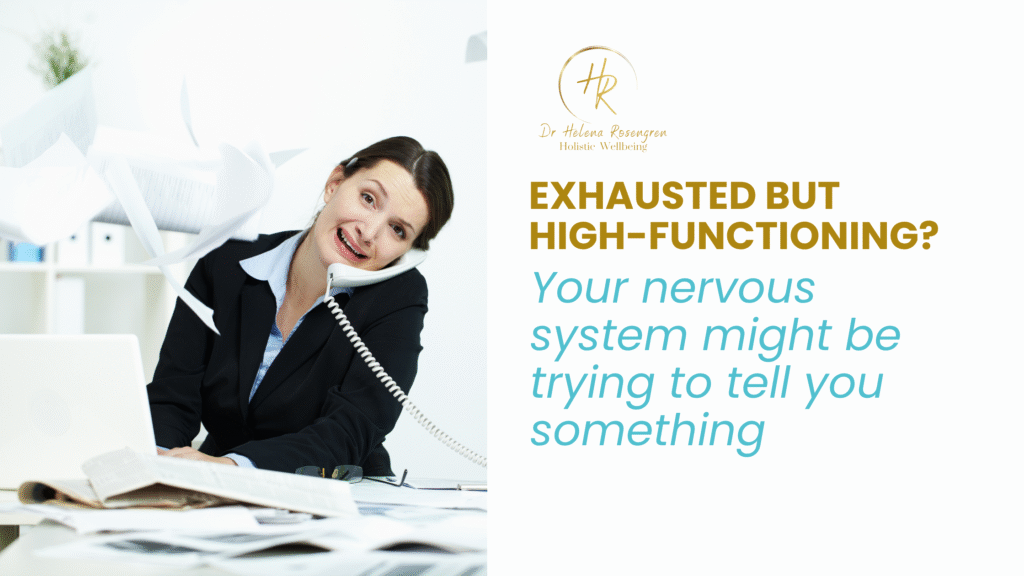You’re the one people rely on.
You manage and deliver.
You keep it together, even when no one else can.
But beneath that competence, there’s often a quiet, persistent fatigue. Not just tiredness, but a kind of low-level depletion that sleep, supplements, and holidays don’t seem to touch.
You might brush it off as a phase. You’re still functioning, after all. Still showing up. Still ticking the boxes.
But what if this exhaustion isn’t just physical?
What if it’s your nervous system trying to get your attention?
This is where reinvention begins. Not from crisis, but from an inner knowing that life is meant to feel more alive than this.

When your nervous system stays stuck in survival
Many high-capacity women live in what is often called ‘functional freeze’. You’re not falling apart. You’re performing. But you’re also:
- Tired even after rest
- Easily irritated or distracted
- Avoiding stillness
- Losing touch with joy, creativity, or spontaneity
- Feeling like you’re slowly vanishing from your own life
This isn’t weakness. It’s adaptation.
Your body has learned to prioritise output over ease, and self-protection over presence.
Why doing more stops working
If you’re always coping, always pushing through, you might miss the signs that your system is running on survival mode. What once looked like strength can become rigidity. What looked like productivity can become a shield.
Over time, especially in high-pressure environments, your nervous system adapts. It begins to associate doing, coping, and performing with safety and approval – because that’s what has worked in the past. You’ve been praised, relied on, and even admired for your ability to push through.
So your system wires itself to stay on: hyper-focused on getting things done. This becomes your baseline.
But the cost?
You lose access to states of ease, creativity, playfulness, and deep rest. You might notice you can’t sit still without feeling guilty. Being in the moment can feel unfamiliar, even unsafe for some.
That’s why doing more eventually stops working.
Because what you’re dealing with isn’t about time or energy management. It’s about a nervous system that’s learned to survive by staying on guard. Rest doesn’t land. Joy feels distant. And the tools that once helped you keep going now keep you stuck.
The way forward isn’t to push harder – it’s to gently show your system a new pattern. One where safety isn’t tied to performance, and being present doesn’t feel like a threat.
The nervous system doesn’t respond to logic. It responds to experience.
It needs evidence that it’s safe to slow down, safe to rest, safe to be seen.

What helped me begin to shift
Years ago, I myself felt half-alive while leading life that was far too busy.
The turning point wasn’t a dramatic overhaul. It was small shifts:
– Noticing when I tensed before replying to a request
– Breathwork to switch on the parasympathetic system (the fast double inhale through the nose, followed by a long exhale through the mouth is especially helpful.)
-Creating pauses between tasks
-Naming needs without apologising
-Deliberately practicing rest without justification
These tiny changes helped my system learn a new rhythm. One based on presence, not performance.
If you’re exhausted but still functioning, you’re not broken.
You may simply be ready for a new way of being.
One that doesn’t require collapse before you begin to listen.

Curious for more? Sign up here to never miss a post!
Explore Our Program Suites
Feeling out of sync or burdened by expectations? Our Program Suites offer practical tools to help you reset your rhythm and realign with what truly matters.
Leave a Comment
Have you ever felt disconnected from the life you built? What small shift helped you reconnect? We’d love to hear your story—drop a comment below and share your experience!


